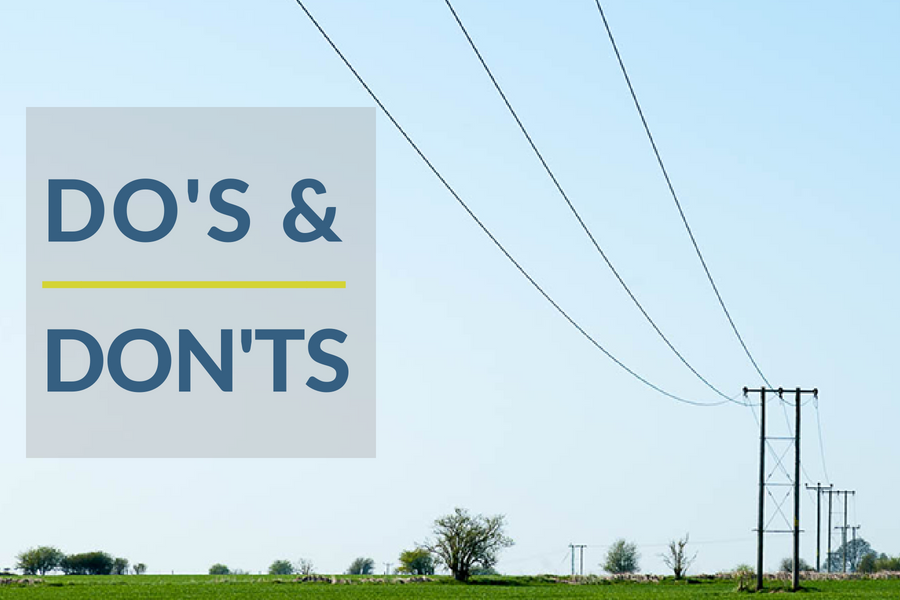13 Do’s and Don’ts for securing lucrative ground rents from energy schemes
Published March 2018
There are opportunities for landowners to earn lucrative incomes from power generation and energy storage schemes. However, the highest incomes can be gained by safeguarding your grid rights and following independent, expert advice. Below are some tips to ensure you secure the best ground rents from hosting power generation or energy storage schemes.
Do:
1. Do secure grid connection offers independently of any developers – you can then put your sites out to developers for competing offers and choose the one that delivers you the highest returns.
2. Do apply for the technology most likely to deliver the best value – battery storage, gas genset, solar, hydro, wind – your site won’t be suitable for all these technologies and maybe only one. It’s important to apply for a grid connection for the right technology and scale, and the one which suits market demand.
3. Do proactively seek grid rights ahead of your neighbours – grid capacity is getting in short supply. Applications are dealt with on a first-come first-served basis. Any delays could mean you miss out to a neighbour on the same part of the grid.
4. Do put sites out to competition between different developers – your best returns will come from a process whereby the best developers compete for your site, and not one where you jump straight in with, and are tied to, one developer.
5. Do vet developers and only deal with the most credible – the boom in the renewable energy and storage markets has seen some inexperienced and under-resourced developers entering the market for sites. You must be confident that you are dealing with the best players in the market, who will be around to see your scheme through to completion.
6. Do seek specialist, expert and independent technical, strategic and tactical advice – the boom in the market has also seen a scourge of grid ‘advisers’. Some are unscrupulously exploiting landowners; others lack the expertise to successfully secure landowners a scheme. Land agents are great at negotiating option and lease terms, but the grid connection rights are not their area of expertise.
7. Do have an independent and professional review of your potential site before submitting a grid application – the unscrupulous ‘advisers’ mentioned above offer to put in non-bespoke grid applications for landowners at a fee – and there are now costs payable to DNOs for most applications too. It’s important to have your land assessed for any potential schemes – and the most suitable technology and scale – by an independent expert before submitting an application.
8. Do only have any grid applications submitted on a no-win no-fee basis – a consultant who understands both your local network and the current market conditions, and who is confident that a grid application will be successful, should offer to submit your connection application on a no-win no-fee basis. Advisers’ fees can be paid by the developer if a scheme is successful. If an advisor charges you for an application, are they confident the application will succeed?
Don’t:
9. Don’t sign developers’ letters authorising them to apply for a grid connection – if you’ve been approached by a developer don’t authorise them to apply for grid connection on your land. To keep you in control of the process and in a strong negotiating position, get independent, expert help to secure your grid rights.
10. Don’t wait for a developer to come knocking on your door – grid capacity is in short supply and if you want to secure grid for a scheme you need to act fast. Have your land independently assessed for opportunities, apply for grid rights, and only then get competing terms from a number of the best developers.
11. Don’t put a site out to competition until grid rights are safeguarded – any alert to developers that a site or part of the grid may have capacity will send a swarm of other developers swooping on your neighbours in a rush to secure grid capacity ahead of you. Secure the grid rights first – and only then offer competing bids from developers.
12. Don’t sign over control of grid rights until negotiations conclude – it’s important that you maintain control of the negotiating process throughout. Signing over control of the grid to a developer will put you in a much weaker bargaining position.
13. Don’t pay huge fees for a boilerplate grid application to be submitted – we know of advisers who prepare generic applications for one technology for one scale. This approach is hit-or-miss. Landowners should have a bespoke grid application submitted for the right technology at the right scale. Paying a little first for an in-depth study to discover what is best, if anything, is better than paying £1000 plus for a templated grid application which is likely to fail.
To avoid the pitfalls and for independent, expert advice to help you maximise your incomes from energy schemes, call us now on 01993 830571 or send us a message via our contact form.


